Strategic Importance and Impact: Vodafone's Global Growth Report
VerifiedAdded on 2022/12/01
|8
|1363
|73
Report
AI Summary
This report provides a comprehensive analysis of Vodafone's global strategy, focusing on its strategic importance and impact in the telecommunications industry. It begins with an introduction to global strategy and its relevance, followed by a discussion on globalization, its importance, and its impact on global trade and Vodafone. The report then delves into the analytical tools and theories of international business, including a PESTEL analysis of Vodafone's external environment and an examination of international business theories like comparative advantage and global strategic rivalry. Furthermore, it evaluates Vodafone's international business strategies, entry mode strategies, and offers recommendations for future growth. The report concludes with a summary of key findings and a list of references.
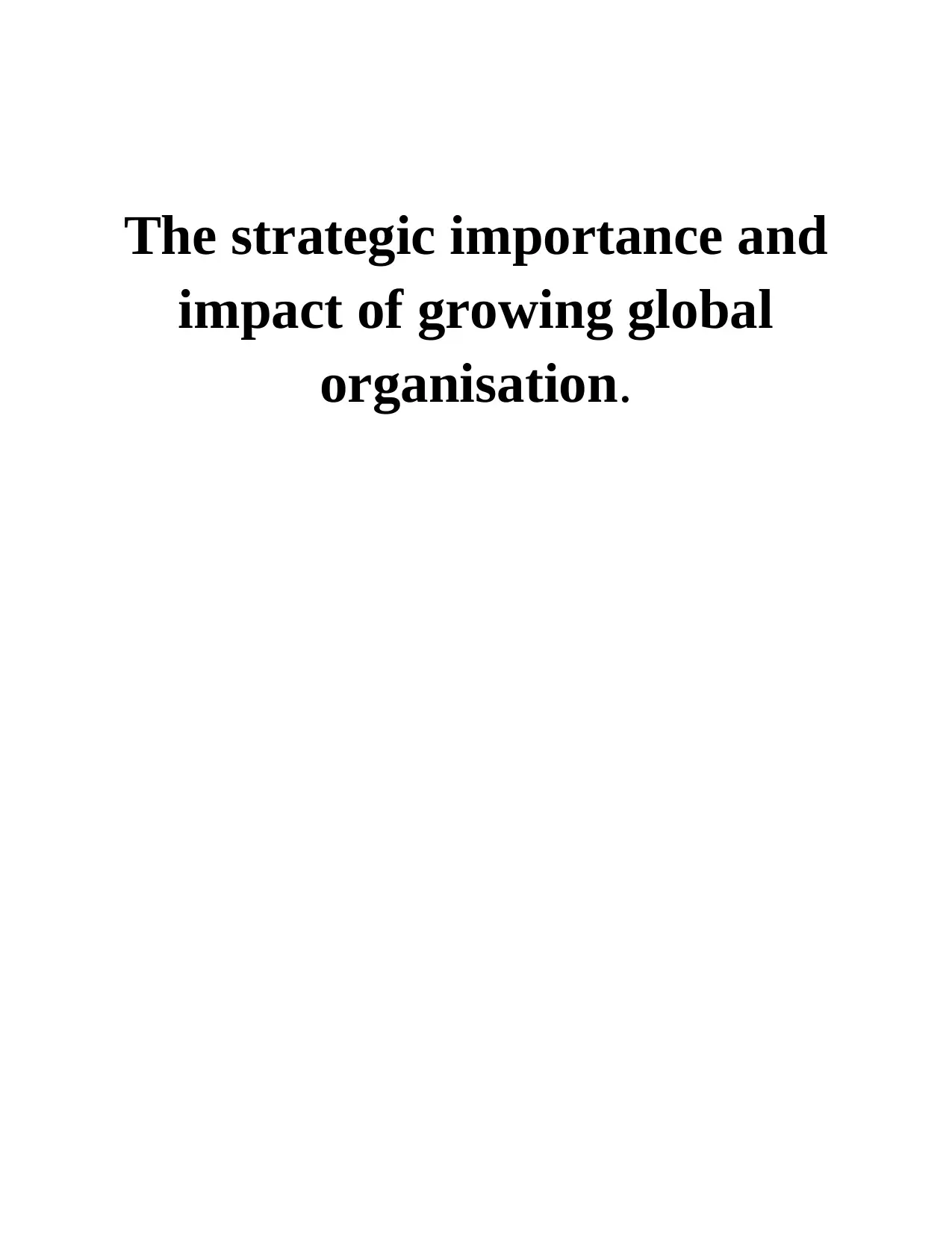
The strategic importance and
impact of growing global
organisation.
impact of growing global
organisation.
Paraphrase This Document
Need a fresh take? Get an instant paraphrase of this document with our AI Paraphraser
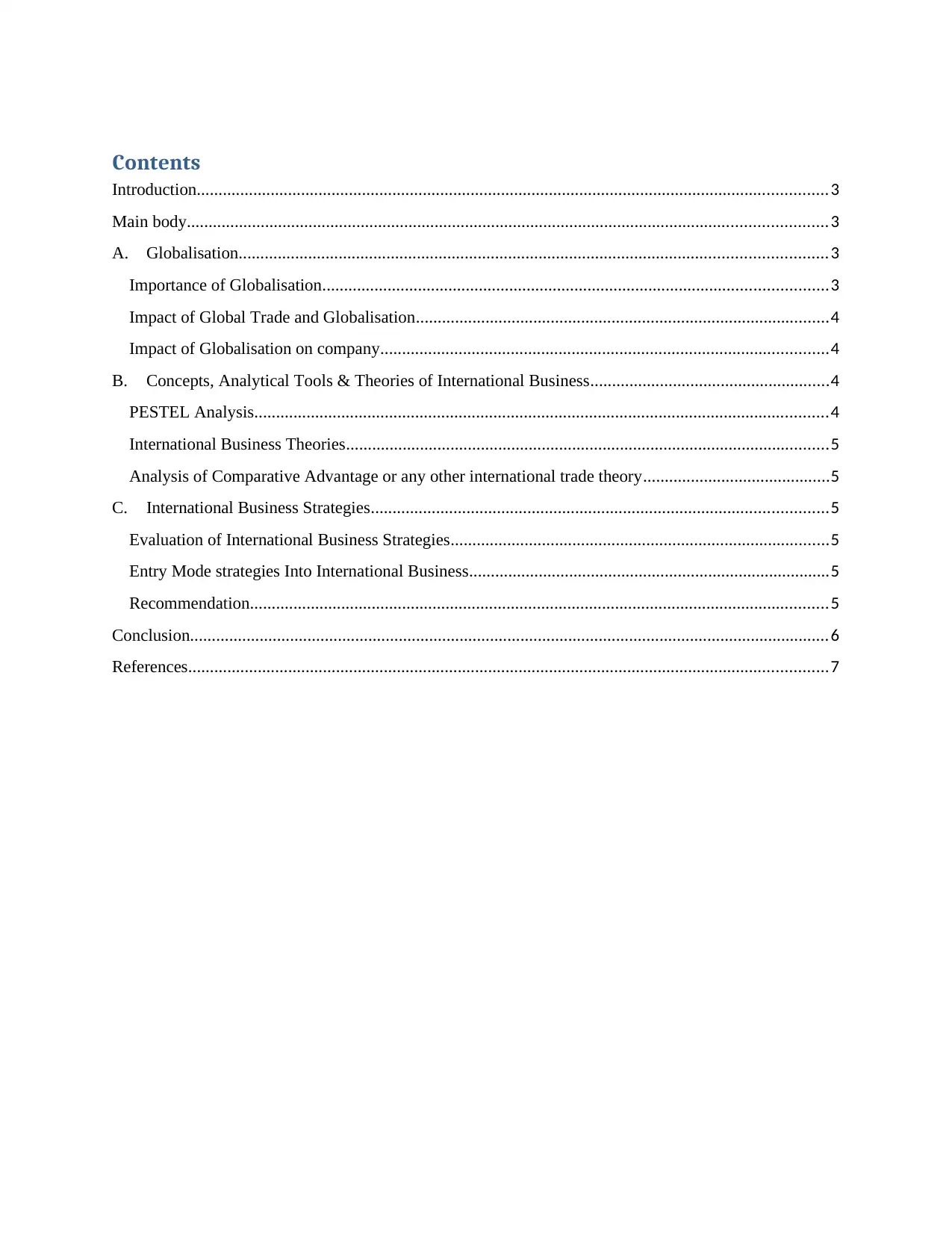
Contents
Introduction.................................................................................................................................................3
Main body...................................................................................................................................................3
A. Globalisation.......................................................................................................................................3
Importance of Globalisation....................................................................................................................3
Impact of Global Trade and Globalisation...............................................................................................4
Impact of Globalisation on company.......................................................................................................4
B. Concepts, Analytical Tools & Theories of International Business.......................................................4
PESTEL Analysis....................................................................................................................................4
International Business Theories...............................................................................................................5
Analysis of Comparative Advantage or any other international trade theory...........................................5
C. International Business Strategies.........................................................................................................5
Evaluation of International Business Strategies.......................................................................................5
Entry Mode strategies Into International Business...................................................................................5
Recommendation.....................................................................................................................................5
Conclusion...................................................................................................................................................6
References...................................................................................................................................................7
Introduction.................................................................................................................................................3
Main body...................................................................................................................................................3
A. Globalisation.......................................................................................................................................3
Importance of Globalisation....................................................................................................................3
Impact of Global Trade and Globalisation...............................................................................................4
Impact of Globalisation on company.......................................................................................................4
B. Concepts, Analytical Tools & Theories of International Business.......................................................4
PESTEL Analysis....................................................................................................................................4
International Business Theories...............................................................................................................5
Analysis of Comparative Advantage or any other international trade theory...........................................5
C. International Business Strategies.........................................................................................................5
Evaluation of International Business Strategies.......................................................................................5
Entry Mode strategies Into International Business...................................................................................5
Recommendation.....................................................................................................................................5
Conclusion...................................................................................................................................................6
References...................................................................................................................................................7
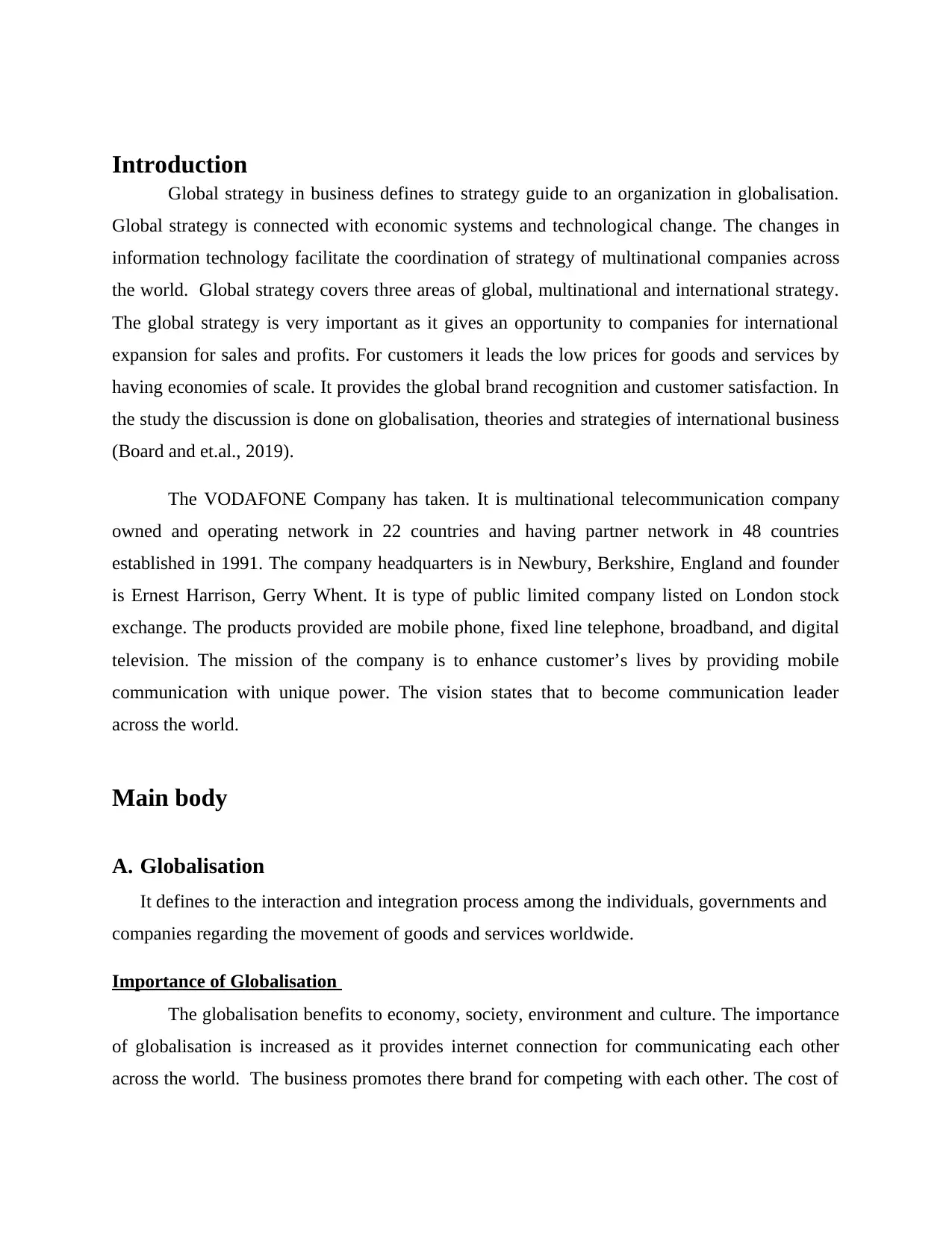
Introduction
Global strategy in business defines to strategy guide to an organization in globalisation.
Global strategy is connected with economic systems and technological change. The changes in
information technology facilitate the coordination of strategy of multinational companies across
the world. Global strategy covers three areas of global, multinational and international strategy.
The global strategy is very important as it gives an opportunity to companies for international
expansion for sales and profits. For customers it leads the low prices for goods and services by
having economies of scale. It provides the global brand recognition and customer satisfaction. In
the study the discussion is done on globalisation, theories and strategies of international business
(Board and et.al., 2019).
The VODAFONE Company has taken. It is multinational telecommunication company
owned and operating network in 22 countries and having partner network in 48 countries
established in 1991. The company headquarters is in Newbury, Berkshire, England and founder
is Ernest Harrison, Gerry Whent. It is type of public limited company listed on London stock
exchange. The products provided are mobile phone, fixed line telephone, broadband, and digital
television. The mission of the company is to enhance customer’s lives by providing mobile
communication with unique power. The vision states that to become communication leader
across the world.
Main body
A. Globalisation
It defines to the interaction and integration process among the individuals, governments and
companies regarding the movement of goods and services worldwide.
Importance of Globalisation
The globalisation benefits to economy, society, environment and culture. The importance
of globalisation is increased as it provides internet connection for communicating each other
across the world. The business promotes there brand for competing with each other. The cost of
Global strategy in business defines to strategy guide to an organization in globalisation.
Global strategy is connected with economic systems and technological change. The changes in
information technology facilitate the coordination of strategy of multinational companies across
the world. Global strategy covers three areas of global, multinational and international strategy.
The global strategy is very important as it gives an opportunity to companies for international
expansion for sales and profits. For customers it leads the low prices for goods and services by
having economies of scale. It provides the global brand recognition and customer satisfaction. In
the study the discussion is done on globalisation, theories and strategies of international business
(Board and et.al., 2019).
The VODAFONE Company has taken. It is multinational telecommunication company
owned and operating network in 22 countries and having partner network in 48 countries
established in 1991. The company headquarters is in Newbury, Berkshire, England and founder
is Ernest Harrison, Gerry Whent. It is type of public limited company listed on London stock
exchange. The products provided are mobile phone, fixed line telephone, broadband, and digital
television. The mission of the company is to enhance customer’s lives by providing mobile
communication with unique power. The vision states that to become communication leader
across the world.
Main body
A. Globalisation
It defines to the interaction and integration process among the individuals, governments and
companies regarding the movement of goods and services worldwide.
Importance of Globalisation
The globalisation benefits to economy, society, environment and culture. The importance
of globalisation is increased as it provides internet connection for communicating each other
across the world. The business promotes there brand for competing with each other. The cost of
⊘ This is a preview!⊘
Do you want full access?
Subscribe today to unlock all pages.

Trusted by 1+ million students worldwide
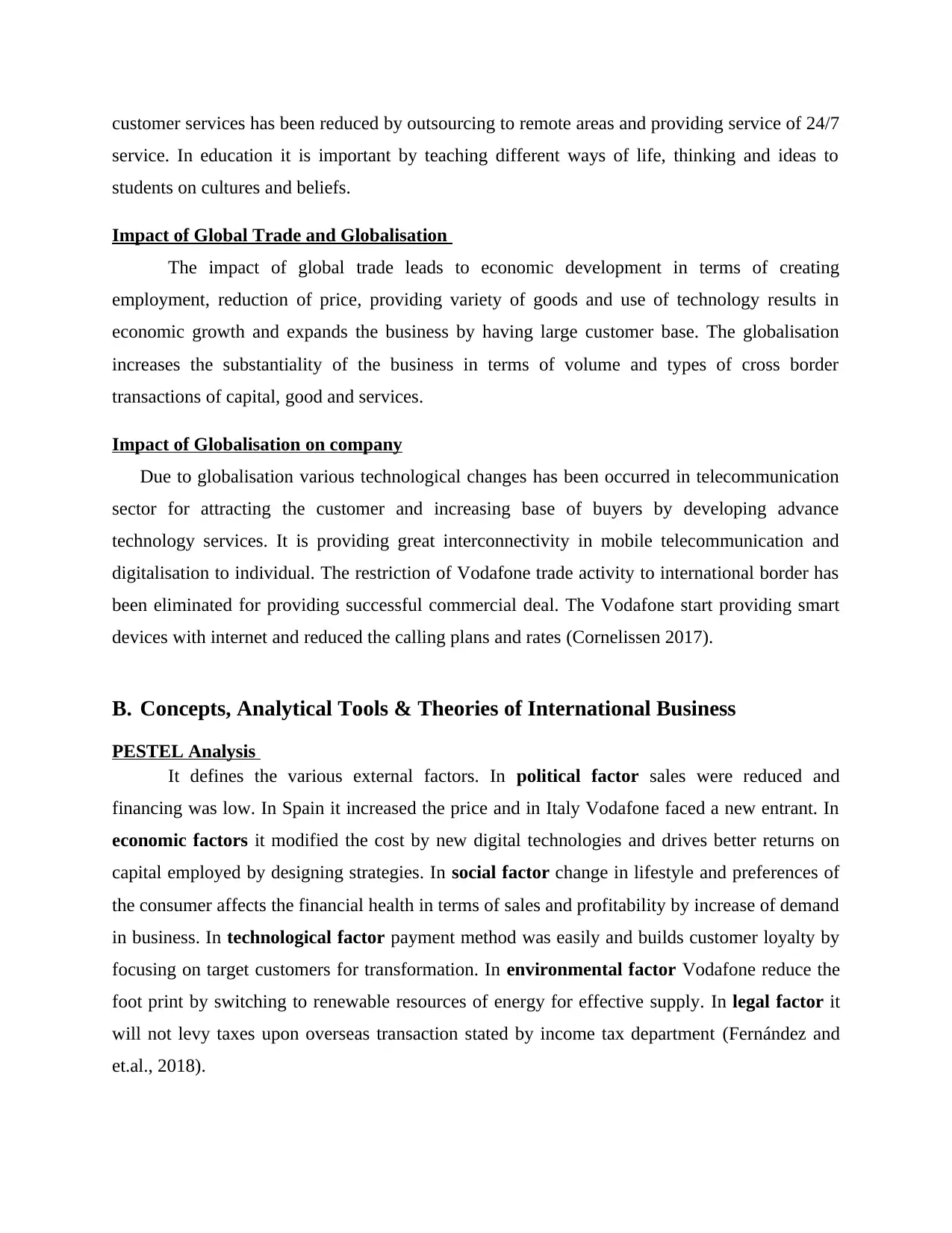
customer services has been reduced by outsourcing to remote areas and providing service of 24/7
service. In education it is important by teaching different ways of life, thinking and ideas to
students on cultures and beliefs.
Impact of Global Trade and Globalisation
The impact of global trade leads to economic development in terms of creating
employment, reduction of price, providing variety of goods and use of technology results in
economic growth and expands the business by having large customer base. The globalisation
increases the substantiality of the business in terms of volume and types of cross border
transactions of capital, good and services.
Impact of Globalisation on company
Due to globalisation various technological changes has been occurred in telecommunication
sector for attracting the customer and increasing base of buyers by developing advance
technology services. It is providing great interconnectivity in mobile telecommunication and
digitalisation to individual. The restriction of Vodafone trade activity to international border has
been eliminated for providing successful commercial deal. The Vodafone start providing smart
devices with internet and reduced the calling plans and rates (Cornelissen 2017).
B. Concepts, Analytical Tools & Theories of International Business
PESTEL Analysis
It defines the various external factors. In political factor sales were reduced and
financing was low. In Spain it increased the price and in Italy Vodafone faced a new entrant. In
economic factors it modified the cost by new digital technologies and drives better returns on
capital employed by designing strategies. In social factor change in lifestyle and preferences of
the consumer affects the financial health in terms of sales and profitability by increase of demand
in business. In technological factor payment method was easily and builds customer loyalty by
focusing on target customers for transformation. In environmental factor Vodafone reduce the
foot print by switching to renewable resources of energy for effective supply. In legal factor it
will not levy taxes upon overseas transaction stated by income tax department (Fernández and
et.al., 2018).
service. In education it is important by teaching different ways of life, thinking and ideas to
students on cultures and beliefs.
Impact of Global Trade and Globalisation
The impact of global trade leads to economic development in terms of creating
employment, reduction of price, providing variety of goods and use of technology results in
economic growth and expands the business by having large customer base. The globalisation
increases the substantiality of the business in terms of volume and types of cross border
transactions of capital, good and services.
Impact of Globalisation on company
Due to globalisation various technological changes has been occurred in telecommunication
sector for attracting the customer and increasing base of buyers by developing advance
technology services. It is providing great interconnectivity in mobile telecommunication and
digitalisation to individual. The restriction of Vodafone trade activity to international border has
been eliminated for providing successful commercial deal. The Vodafone start providing smart
devices with internet and reduced the calling plans and rates (Cornelissen 2017).
B. Concepts, Analytical Tools & Theories of International Business
PESTEL Analysis
It defines the various external factors. In political factor sales were reduced and
financing was low. In Spain it increased the price and in Italy Vodafone faced a new entrant. In
economic factors it modified the cost by new digital technologies and drives better returns on
capital employed by designing strategies. In social factor change in lifestyle and preferences of
the consumer affects the financial health in terms of sales and profitability by increase of demand
in business. In technological factor payment method was easily and builds customer loyalty by
focusing on target customers for transformation. In environmental factor Vodafone reduce the
foot print by switching to renewable resources of energy for effective supply. In legal factor it
will not levy taxes upon overseas transaction stated by income tax department (Fernández and
et.al., 2018).
Paraphrase This Document
Need a fresh take? Get an instant paraphrase of this document with our AI Paraphraser
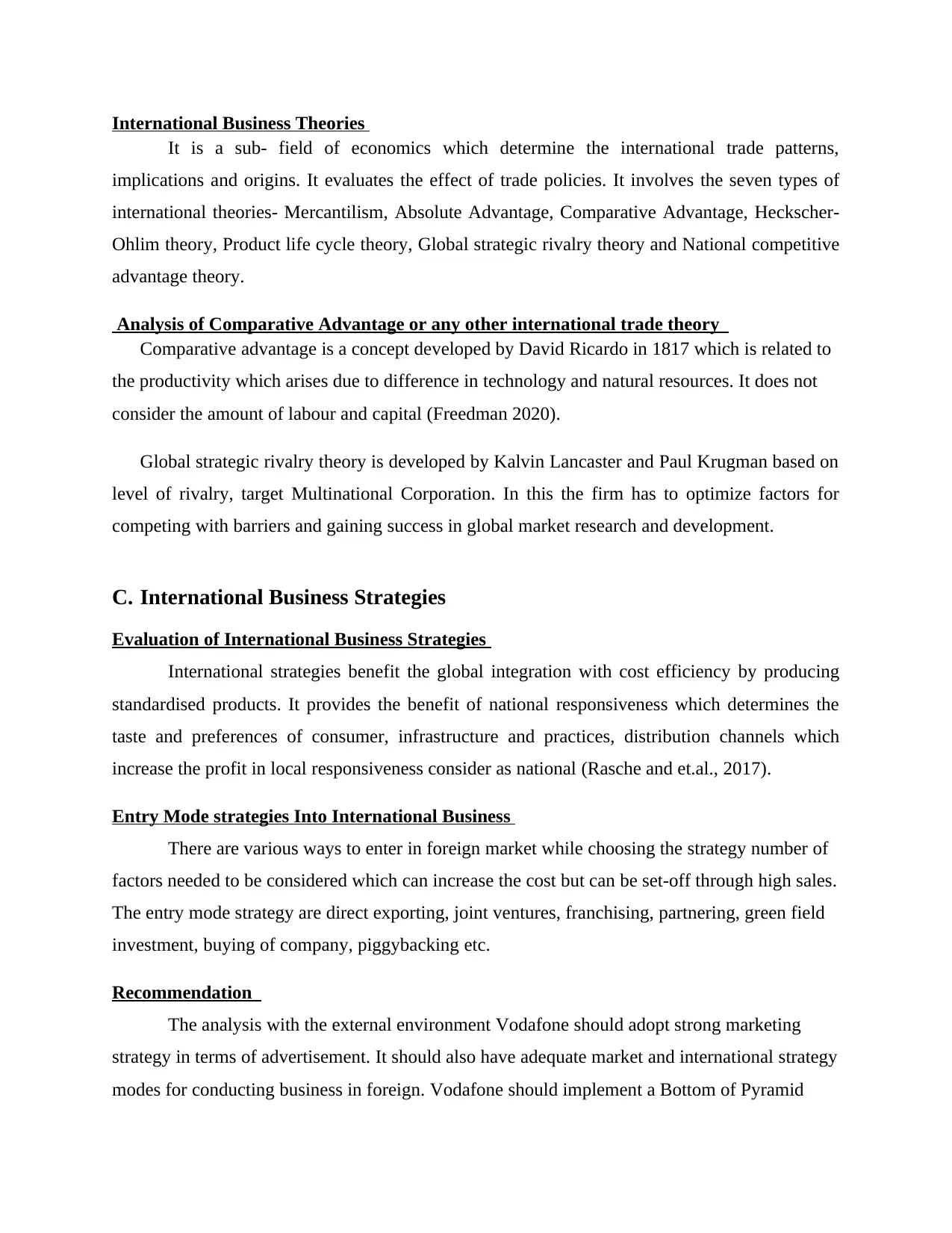
International Business Theories
It is a sub- field of economics which determine the international trade patterns,
implications and origins. It evaluates the effect of trade policies. It involves the seven types of
international theories- Mercantilism, Absolute Advantage, Comparative Advantage, Heckscher-
Ohlim theory, Product life cycle theory, Global strategic rivalry theory and National competitive
advantage theory.
Analysis of Comparative Advantage or any other international trade theory
Comparative advantage is a concept developed by David Ricardo in 1817 which is related to
the productivity which arises due to difference in technology and natural resources. It does not
consider the amount of labour and capital (Freedman 2020).
Global strategic rivalry theory is developed by Kalvin Lancaster and Paul Krugman based on
level of rivalry, target Multinational Corporation. In this the firm has to optimize factors for
competing with barriers and gaining success in global market research and development.
C. International Business Strategies
Evaluation of International Business Strategies
International strategies benefit the global integration with cost efficiency by producing
standardised products. It provides the benefit of national responsiveness which determines the
taste and preferences of consumer, infrastructure and practices, distribution channels which
increase the profit in local responsiveness consider as national (Rasche and et.al., 2017).
Entry Mode strategies Into International Business
There are various ways to enter in foreign market while choosing the strategy number of
factors needed to be considered which can increase the cost but can be set-off through high sales.
The entry mode strategy are direct exporting, joint ventures, franchising, partnering, green field
investment, buying of company, piggybacking etc.
Recommendation
The analysis with the external environment Vodafone should adopt strong marketing
strategy in terms of advertisement. It should also have adequate market and international strategy
modes for conducting business in foreign. Vodafone should implement a Bottom of Pyramid
It is a sub- field of economics which determine the international trade patterns,
implications and origins. It evaluates the effect of trade policies. It involves the seven types of
international theories- Mercantilism, Absolute Advantage, Comparative Advantage, Heckscher-
Ohlim theory, Product life cycle theory, Global strategic rivalry theory and National competitive
advantage theory.
Analysis of Comparative Advantage or any other international trade theory
Comparative advantage is a concept developed by David Ricardo in 1817 which is related to
the productivity which arises due to difference in technology and natural resources. It does not
consider the amount of labour and capital (Freedman 2020).
Global strategic rivalry theory is developed by Kalvin Lancaster and Paul Krugman based on
level of rivalry, target Multinational Corporation. In this the firm has to optimize factors for
competing with barriers and gaining success in global market research and development.
C. International Business Strategies
Evaluation of International Business Strategies
International strategies benefit the global integration with cost efficiency by producing
standardised products. It provides the benefit of national responsiveness which determines the
taste and preferences of consumer, infrastructure and practices, distribution channels which
increase the profit in local responsiveness consider as national (Rasche and et.al., 2017).
Entry Mode strategies Into International Business
There are various ways to enter in foreign market while choosing the strategy number of
factors needed to be considered which can increase the cost but can be set-off through high sales.
The entry mode strategy are direct exporting, joint ventures, franchising, partnering, green field
investment, buying of company, piggybacking etc.
Recommendation
The analysis with the external environment Vodafone should adopt strong marketing
strategy in terms of advertisement. It should also have adequate market and international strategy
modes for conducting business in foreign. Vodafone should implement a Bottom of Pyramid
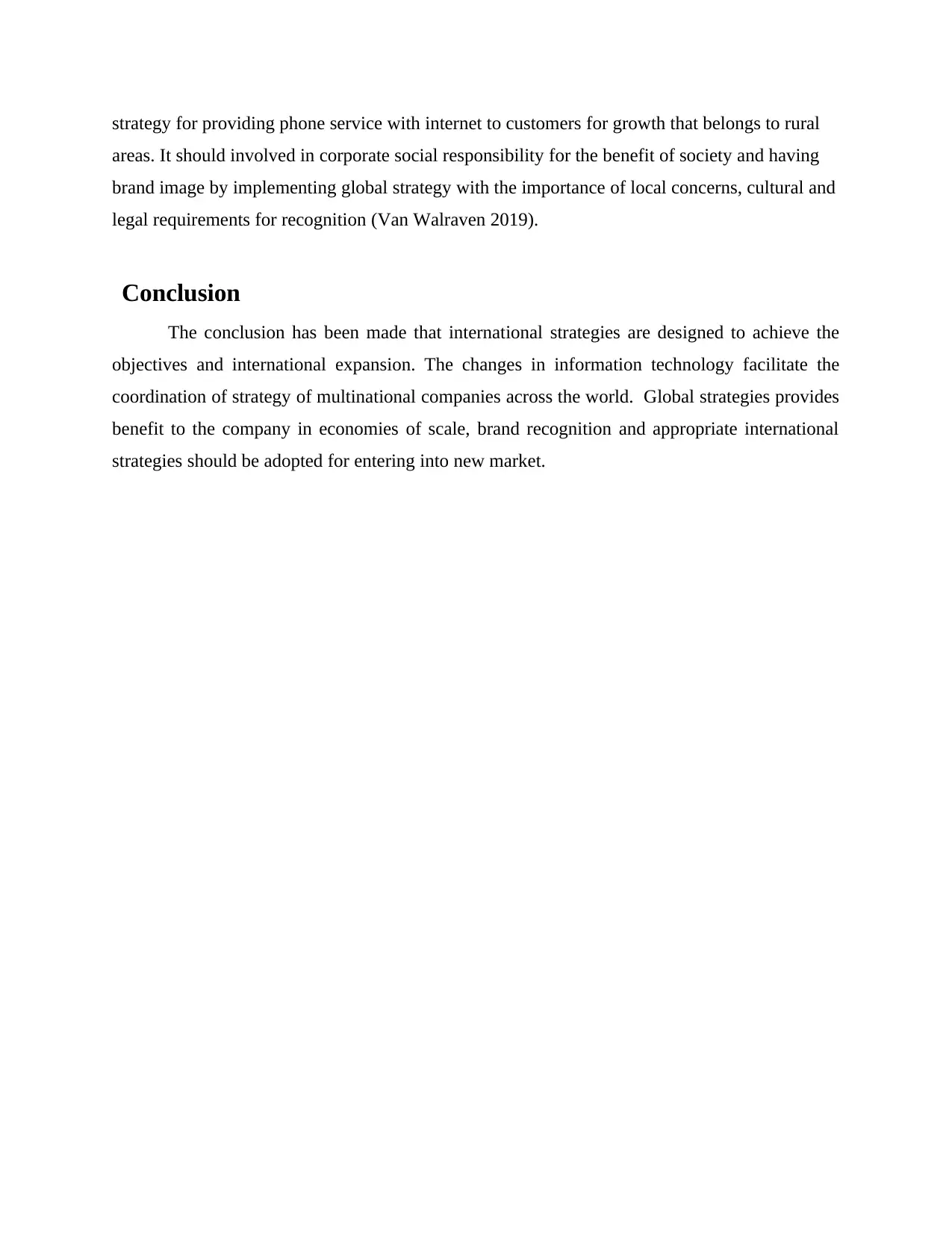
strategy for providing phone service with internet to customers for growth that belongs to rural
areas. It should involved in corporate social responsibility for the benefit of society and having
brand image by implementing global strategy with the importance of local concerns, cultural and
legal requirements for recognition (Van Walraven 2019).
Conclusion
The conclusion has been made that international strategies are designed to achieve the
objectives and international expansion. The changes in information technology facilitate the
coordination of strategy of multinational companies across the world. Global strategies provides
benefit to the company in economies of scale, brand recognition and appropriate international
strategies should be adopted for entering into new market.
areas. It should involved in corporate social responsibility for the benefit of society and having
brand image by implementing global strategy with the importance of local concerns, cultural and
legal requirements for recognition (Van Walraven 2019).
Conclusion
The conclusion has been made that international strategies are designed to achieve the
objectives and international expansion. The changes in information technology facilitate the
coordination of strategy of multinational companies across the world. Global strategies provides
benefit to the company in economies of scale, brand recognition and appropriate international
strategies should be adopted for entering into new market.
⊘ This is a preview!⊘
Do you want full access?
Subscribe today to unlock all pages.

Trusted by 1+ million students worldwide
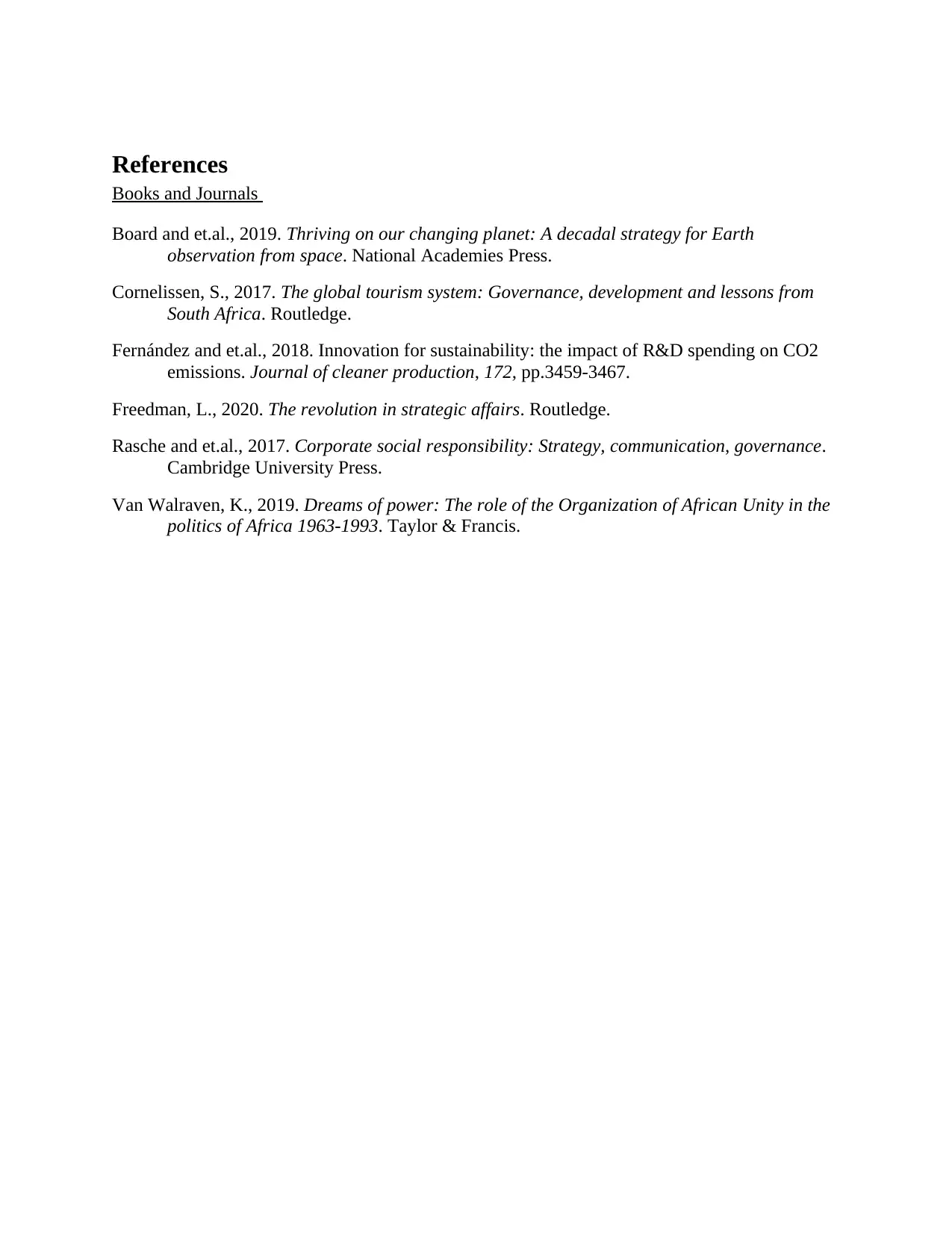
References
Books and Journals
Board and et.al., 2019. Thriving on our changing planet: A decadal strategy for Earth
observation from space. National Academies Press.
Cornelissen, S., 2017. The global tourism system: Governance, development and lessons from
South Africa. Routledge.
Fernández and et.al., 2018. Innovation for sustainability: the impact of R&D spending on CO2
emissions. Journal of cleaner production, 172, pp.3459-3467.
Freedman, L., 2020. The revolution in strategic affairs. Routledge.
Rasche and et.al., 2017. Corporate social responsibility: Strategy, communication, governance.
Cambridge University Press.
Van Walraven, K., 2019. Dreams of power: The role of the Organization of African Unity in the
politics of Africa 1963-1993. Taylor & Francis.
Books and Journals
Board and et.al., 2019. Thriving on our changing planet: A decadal strategy for Earth
observation from space. National Academies Press.
Cornelissen, S., 2017. The global tourism system: Governance, development and lessons from
South Africa. Routledge.
Fernández and et.al., 2018. Innovation for sustainability: the impact of R&D spending on CO2
emissions. Journal of cleaner production, 172, pp.3459-3467.
Freedman, L., 2020. The revolution in strategic affairs. Routledge.
Rasche and et.al., 2017. Corporate social responsibility: Strategy, communication, governance.
Cambridge University Press.
Van Walraven, K., 2019. Dreams of power: The role of the Organization of African Unity in the
politics of Africa 1963-1993. Taylor & Francis.
Paraphrase This Document
Need a fresh take? Get an instant paraphrase of this document with our AI Paraphraser

1 out of 8
Related Documents
Your All-in-One AI-Powered Toolkit for Academic Success.
+13062052269
info@desklib.com
Available 24*7 on WhatsApp / Email
![[object Object]](/_next/static/media/star-bottom.7253800d.svg)
Unlock your academic potential
Copyright © 2020–2026 A2Z Services. All Rights Reserved. Developed and managed by ZUCOL.





